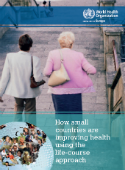How small countries are improving health using the life-course approach (2017)

Download
2017, xiii + 68 pages
ISBN 978 92 890 5252 8
This publication is only available online
The life-course approach encompasses actions that are taken early, appropriately to life’s transitions and together as a whole society and is one of the key concepts among the priority areas for policy action of the WHO European policy framework Health 2020.
The Andorra Statement, originating from the Second High-level Meeting of Small Countries (2015), called for investment in health promotion and disease prevention programmes in the early stages of life because of their high economic, social, development and equity returns. Both the Minsk Declaration itself and the Resolution on the Minsk Declaration on the Lifecourse Approach in the Context of Health 2020 provide further support, encouraging this approach to be embraced. In 2016 the WHO Regional Office for Europe asked the small countries to share their experiences with implementing life-course actions.
Issues reported on included:
- nutrition throughout the life-course;
- physical activity;
- overweight and obesity prevention;
- early childhood development;
- vaccines;
- supporting parenthood;
- increasing adolescent health knowledge;
- adverse childhood experiences; and
- long-term integrated health care.
Countries reported that implementing a life-course approach provided an important forum for discussing the issues surrounding the disadvantaged in society, and such disadvantages can be passed intergenerationally. It is therefore important to monitor developments and consider proposals for improvements. There was overall consensus among the eight countries that life-course initiatives helped with the application of a comprehensive approach to health.



